The Best Power Banks to Keep Your Devices Charged All Day
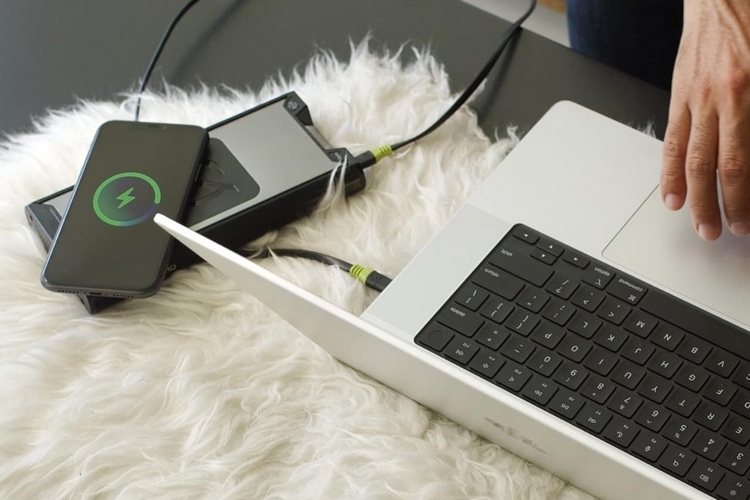
From smartphones and laptops to sports watches and mobile hotspots, we carry a whole load of electronics these days. As such, having a way to charge them as needed has become more important than ever. The last thing you want is to be stuck outside in the middle of the day with your phone teetering on the verge of draining with no way to replenish its juice.
The best power banks are an absolute game changer as far as electronics accessories go. Whether you’re working in the field, adventuring in the outdoors, or just gallivanting during a trip, being able to charge your devices can make a massive difference in your overall experience. We use these devices for work, recreation, and everything in between, after all, so having access to them is an important part of making it through our days.
What should you look for in a power bank? The first thing to look at is capacity, as in how much charge its integrated battery can hold. If you need a power bank that can recharge a phone, you want to look for one with 5,000 mAh minimum. However, if you have more devices you will want to plug in at various points, you’ll need to opt for something bigger. If you need to plug in a laptop at any point, you’ll want to go for something with 20,000 mAh or more, preferably with fast-charging support, since charging a laptop on a slow port can feel like it’s taking forever.
There are power banks with integrated connectors, so you don’t have to carry cables separately, while some will have wireless charging support for compatible phones and devices. Some power banks offer three or more ports for charging multiple devices simultaneously, although some will stick to a bare minimum of slots to keep things more compact. Which one you end up going for will depend on what you prioritize, as they all have their accompanying pros and cons.
These are the best power banks to keep your electronics running all day.
Otterbox Fast Charge
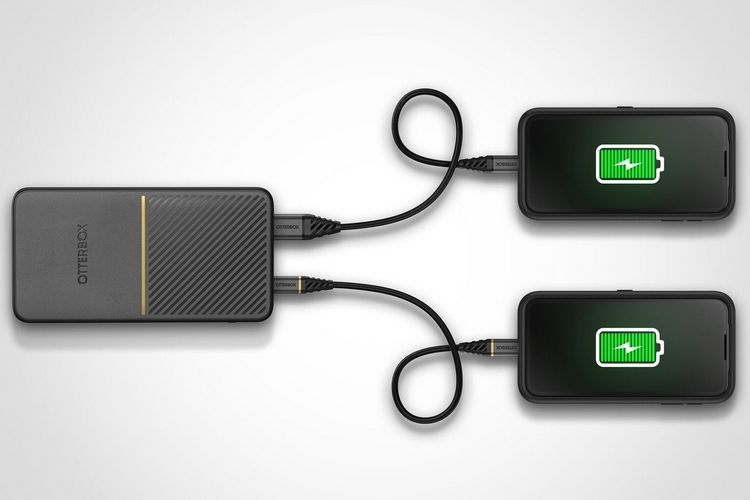
Pros
- Good-looking case
- Decent fast-charging speeds
- Accurate battery indicator
Cons
- Doesn’t charge as fast as more expensive power banks
- Only two ports
Capacity: 20,000 mAh, 18W max
Ports: one USB-C (in/out), one USB-A (in/out)
A great value, this power bank houses a 20,000 mAh battery while coming in at well under $50, giving you plenty of juice to feed your devices. There’s enough power here to recharge a Galaxy S22 Ultra three times with extra power to spare, while taking just slightly over two hours to charge it from zero to 100 percent. The 18W max output is actually available on both ports, with support for Apple 2.4a, Quick Charge 3.0, Samsung 9V, and Huawei 9V charging standards, so you can use it to fast-charge the most popular smartphones in the market. Having a large capacity means it can also charge bigger devices, making it useful if your tablet or DSLR needs a quick boost. The biggest downside here is the fact that it only has two ports, which is really sparse for something with a 20,000 mAh battery onboard. It’s also available in 10,000 mAh and 15,000 mAh capacities, by the way, in case you want something even more affordable.
Baseus Magnetic Power Bank
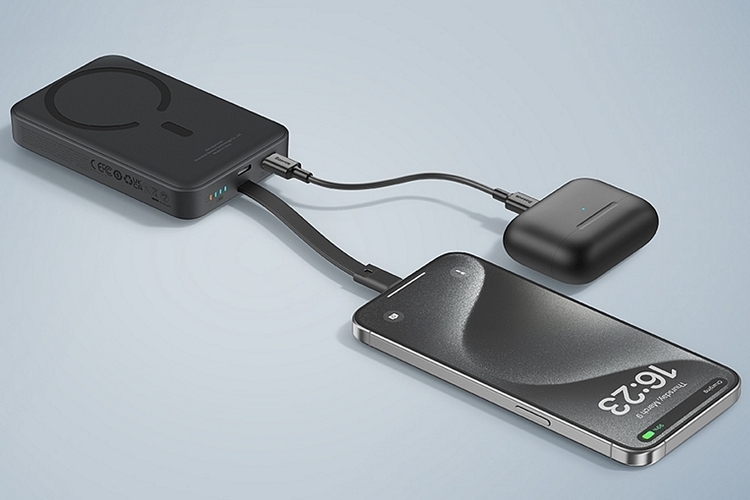
Pros
- 30W fast-charging
- Built-in USB-C cable
- Supports wireless charging
Cons
- No Qi2 support
- Cable doesn’t tuck in discreetly
Capacity: 10,000 mAh, 30W max
Ports: one USB-C, one USB-C cable (in/out), wireless charging pad
There are three ways to charge on this power bank: a built-in USB-C cable, a wireless MagSafe-compatible charging pad, and a standard USB-C port. The built-in cable supports up to 30W fast-charging, so you’ll probably opt for that one every time you get a chance (you can charge most phones completely in under two hours), although you can also use the wireless charging for slower 7.5W if you don’t want to fiddle with the cable. Do note, wireless charging is turned off whenever the cable is in use, although we’ve found it to be a convenient way to charge your smartphone while it sits in the bag (just keep the power bank attached to it magnetically). The cable feels pretty tough, too, a definite step-up from what you normally get built into some power banks, although we don’t like the fact that it dangles on a loop at the end even when everything’s tidied up.
Scosche GoBat
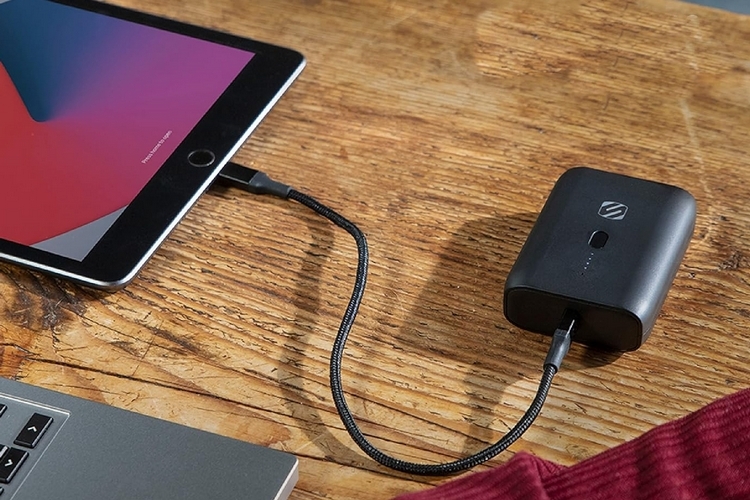
Pros
- Compact, pocket-friendly size
- Good fast-charging speeds
- Three year warranty
Cons
- Thick housing won’t fit in tighter pockets
- Only two ports
Capacity: 10,000 mAh, 20W max
Ports: one USB-C (in/out), one USB-A
We like the compact size of this power bank, which is shorter and narrower but thicker than usual, giving it proportions that we find to be very pocketable. It has two ports, one USB-C and one USB-A, with the USB-C able to deliver 20W of output and the USB-A able to feed 17W to your devices, allowing it to get most phones to 20 percent in around 10 to 15 minutes. When charging the power bank, by the way, the USB-C supports 25W inputs, so you can finish recharging at a relatively good pace. The thicker housing makes it pretty comfortable to hold in hand, with a build that feels reasonably sturdy, so you don’t have to worry about damaging it during day-to-day use.
Nitecore NB10000 Gen II
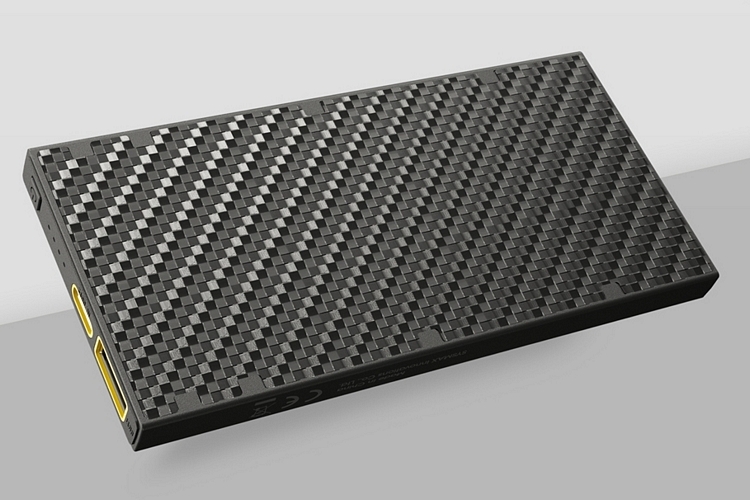
Pros
- Impact-resistant build
- Very slim profile
- Useful low-current mode
Cons
- Power input is only 18W
- Battery life indicator not reliable
Capacity: 10,000 mAh, 18W max
Ports: one USB-C (in/out) one USB-A
With its carbon fiber housing, this power bank can take the kind of bumps and drops that could incapacitate similar devices, making it a great choice for those who need to charge their devices during rugged pursuits. The housing handles water, too, with an IPX5 rating that should allow it to shrug off rain and spills. It has a USB-C port with 20W output and 18W input, so it does a decent job of charging devices, although recharging the power bank itself takes a bit more time than we like. The USB-A slot delivers 18W outputs, as well, so you can do fast charging using either option. We really like the addition of a button next to the ports that can activate a “low current mode” that’s ideal for devices like wireless headphones and activity trackers. We’ve found the need for a similar low-current power bank before during camping and we’d definitely have picked this one if we knew about it then.
Belkin BoostCharge Plus
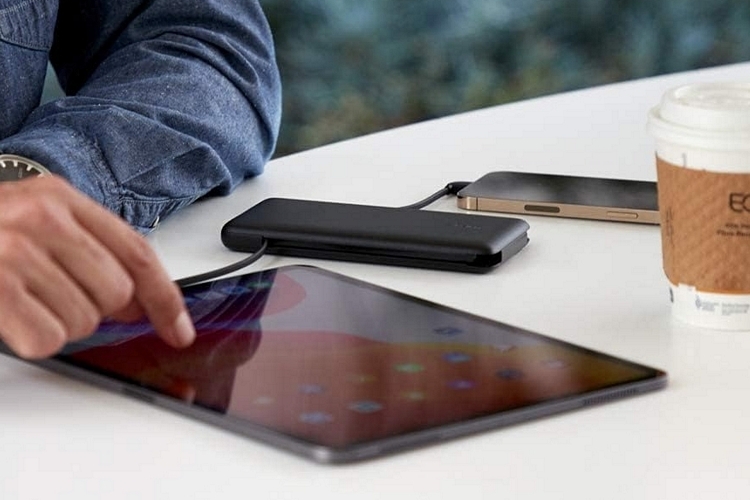
Pros
- Two integrated cables that tuck into the housing
- Supports passthrough charging
- Charges multiple devices with 24W max total output
Cons
- Takes a while to recharge (18W max input)
- Larger than most phones
- Lightning cable may or may not be useful, depending on user
Capacity: 10,000 mAh, 18W max
Ports: one USB-C (in/out), one USB-C cable, one Lightning cable
We love the two cables (one USB-C, one Lightning) integrated into this power bank, allowing you to charge two devices at once (maximum 24W total) with no need to carry a separate cable around. Even better, both cables tuck into the housing’s body, so they don’t dangle around all over the place when not in use. With Lightning definitely on the way out, though, we’d probably prefer a version with two USB-C cables, so you might want to look for one like that if it’s available already. However, if you plan to keep an older iPhone around for a while, this is definitely a good power bank to pick up. You can charge it either using the USB-C cable or the USB-C port, although maximum power input is 18W, so it will take a while to replenish. It also supports passthrough charging, but it will only kick in once the battery is at least 25 percent full, with around 15W of passthrough power available.
Anker MagGo
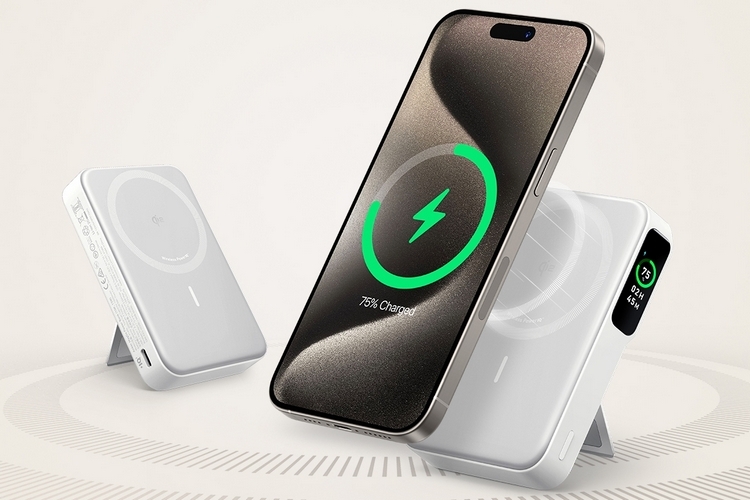
Pros
- Supports 15W Qi2 wireless charging
- Accurate battery LED display
Cons
- Only one USB-C port
Capacity: 10,000 mAh, 15W max
Ports: one USB-C (in/out)
Want a power bank that supports Qi2 15W wireless charging? Anker’s got you covered with this model, whose 10,000 mAh battery holds enough juice to charge an iPhone 15 over one and a half times. The wireless charging is pretty fast, too, replenishing the same phone to 50 percent in around 45 minutes, so you can just snap your phone on the power bank to keep it juiced up, with no need to fiddle with any cables. Do note, this power bank is thick, so there’s no way to keep it in the same pants or jacket pocket with your phone, requiring you to keep it in a bag or pouch if you want to charge your phone wirelessly during transit. Most smartphones in the market, by the way, still don’t support Qi2, so this is only a good model to get if you already own (or plan to get) a compatible device. Other features include a USB-C slot for power input and output and a kickstand for setting it down upright on a desk.
Anker PowerCore 24K
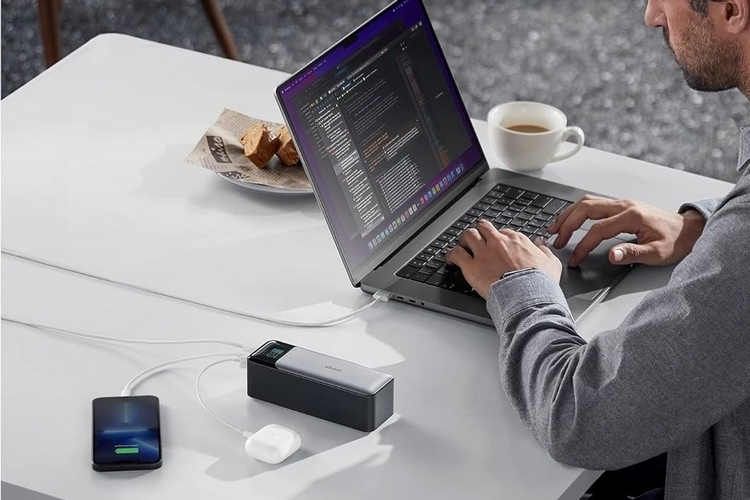
Pros
- Charges laptops with 140W output
- Charges three devices at once with fast charging active
- Useful OLED display
Cons
- Big, heavy, and bulky
- OLED screen uses up significant battery life
Capacity: 24,000 mAh, 140W max
Ports: two USB-C, one USB-A
It’s big and heavy, measuring in at 6.1 x 2.2 x 2 inches and weighing 1.4 pounds, so this is not the kind of power bank you want to carry in your pocket. For all that size and heft, though, you can get a powerful power bank with a 24,000 mAh battery that you can use to charge phones, tablets, and even full-fledged laptops. You get three ports, one USB-A and two USB-C, with the latter able to feed your laptop a whopping 140W of power, allowing you to charge a MacBook Pro 16 to 50 percent capacity in around 40 minutes. Even better, it supports charging with all three ports at once, with the two USB-C delivering 122W total and the USB-A providing up to 18W. Do note, this has a built-in OLED screen for choosing settings, which does drain a fair amount of battery life (around 15 percent total in 24 hours), so you lose quite a bit from that on top of the usual power loss over time.
Goal Zero Sherpa
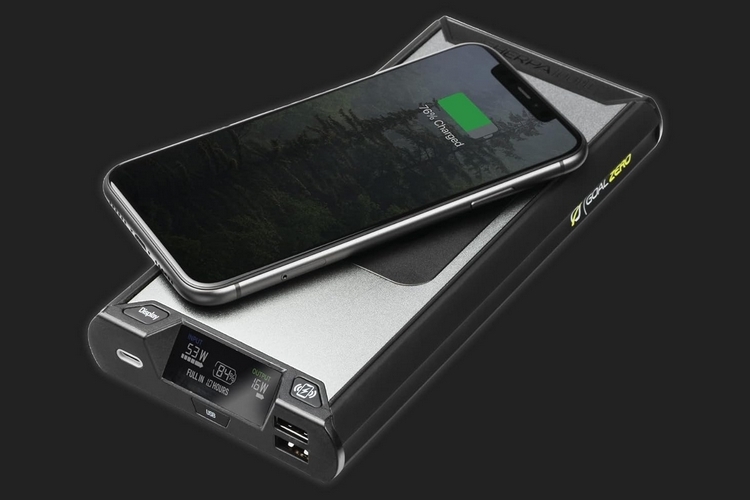
Pros
- Charges laptops with 100W output
- Supports 15W wireless charging
- Durable housing
Cons
Capacity: 20,000 mAh, 18W max
Ports: one USB-C (in/out), two USB-A
Another power bank suited for charging laptops and bigger devices, this one has a 25,600 mAh battery in a housing more reminiscent of smartphone form factors, making it a great choice if you don’t like the chunkier shape of Anker’s power bank above. It only has a single USB-C port, which is capable of delivering 100W power output, allowing you to get most laptops to 50 percent in a little over an hour, with 60W max power input allowing you to recharge it pretty fast, despite the large battery. The top of the device, by the way, has a wireless charging pad that supports 15W wireless charging for compatible devices, while two USB-A ports are able to deliver up to 12W max output. It also gets a color LCD display showing key usage stats, which is so much more useful than your typical LED indicators, as well as a premium aluminum housing with rugged bumper edges.

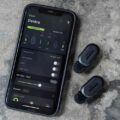
Comments are closed.